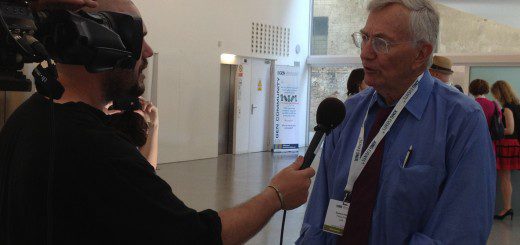By Nicole Blanchett Neheli
As a journalist, I’ve occasionally been told things that were “off the record.” But I was astonished to hear those words from legendary investigative reporter Seymour Hersh.
I was standing an arm’s length from the Pulitzer-Prize-winner, live-tweeting as he spoke on camera about the state of journalism. About 15 minutes in he said, “This is all off the record.”
My head shot up and I replied, “I’ve been tweeting the whole time, and you’re speaking to camera.” He said the segment being shot was for “internal use” by the conference organizers and went on to say how much he hated Twitter.
The 77 year old was sharing stories about his career and thoughts on how news was being covered after completing a keynote address at the Global Editors Network Summit in Barcelona in June. I couldn’t believe he didn’t clue in to the fact that I was tweeting, phone in hand, standing right in front of him.
Or that he would think anything he was saying to camera, surrounded by a group of journalists, would be considered off the record unless he said so at the beginning of the interview.
I also wondered if I’d somehow crossed an ethical line by not identifying I was tweeting when he started talking. Weeks later, these questions kept nagging at me, so I tracked Hersh down via The New Yorker.
In conversation, Hersh was quick to point out he was “completely uninterested” in discussing Twitter, describing it as boring and mindless, and at several points said he didn’t know why I was talking to him.
When I described our interaction in Barcelona, Hersh said he didn’t remember it and found it hard to believe he’d said his comments were off the record—but conceded that it could have happened. He said it would never occur to him I was tweeting because it was a “foolish waste of time.” However, Hersh’s real beef with Twitter is likely that it cramps his style.
Hersh is known to make off-the-cuff remarks that get him into trouble. That doesn’t work so well in an age where comments are instantly sent out and documented using social media.
“By assuming stories can be kept at the level of informal talk, Hersh overlooks the way the mediasphere he works in has been utterly transformed,” reports New York Magazine.
Ivor Shapiro, chair of Ryerson University’s journalism program, in Toronto, echoed that statement saying that current technology means being “off the record isn’t really viable anymore.” He used the example of Mitt Romney’s inflammatory remarks to supporters at a private event that were on the record simply because someone used a cell phone to record them. When I described what happened between me and Hersh, Shapiro, who researches ethics, felt there was no breach of conduct on my part:
“If Sy Hersh is not aware that someone is tweeting, he should be,” said Shapiro.
Hersh himself provided examples of being caught off guard by remarks he presumed were “just a conversation with a human being” turning into a media frenzy and seemed surprised at the interest in his statements.
“I’m not some official. I’m just a fucking reporter,” he said.
And his issues with Twitter aren’t just self-centric. Like many other seasoned journalists, Hersh worries that reporters trying to tweet while they’re working on a story can’t remain focused, and that they’re making comments on events before distilling the knowledge they’re uncovering—both factors that could affect the final product and the accuracy of information being released to the public.
Regardless of whether that’s true, most journalists today don’t have the luxury of choosing whether to share information as they gather it, or the process of storytelling. Multitasking to create multiplatform content, on multiple timelines, is part of the job.
Hersh’s feelings about Twitter exemplify the cultural divide between the old and new guard of journalists: the desire to hold on to workflows that ensure critical thinking and accuracy, up against the need for multi-skilled practitioners juggling multiple platforms.
Although he might disdain it, Hersh understands more about Twitter than he acknowledges. He recognizes its usefulness for getting information off the ground when there’s breaking news and how it can be used to share important information. He actually directed me to his son’s Twitter feed—Joshua Hersh is Huffington Post’s Middle East correspondent—as an example of “how useful” Twitter can be.
I pointed out to Hersh that sharing useful information was why I tweeted his comments. My students couldn’t all follow me to Barcelona, but they could follow my Twitter feed and virtually share in the experience.
Despite his lack of interest in our topic of conversation, Hersh spent the better part of an hour talking to me and assured me I shouldn’t take his comments personally several times. As well, his primary issues with Twitter aren’t that different than mine: mindless information being shared out of context and misinformation being spread.
At the end of our discussion, Hersh admitted he wasn’t a good “learner” when it came to social media but was unrepentant.
“I’m clearly antiquated,” he said. “But I also don’t care.”
That type of irreverence is what makes a lot of journalists good at what they do. Hersh’s work has had, and still has, far reaching impact. He might be “antiquated,” but that doesn’t mean he lacks a point.
As a journalism educator, I focus on best practice. And that includes teaching my students that, as with any story, information sent out through social media needs to be accurate and put into context. And choices made every day, like when and what you tweet or what you say that could be tweeted, can affect your work and your reputation. A lesson we all need to learn, even Seymour Hersh.
Nicole Blanchett Neheli is the executive video editor at J-Source and a broadcast journalism professor at Sheridan College in Oakville, Ont.


